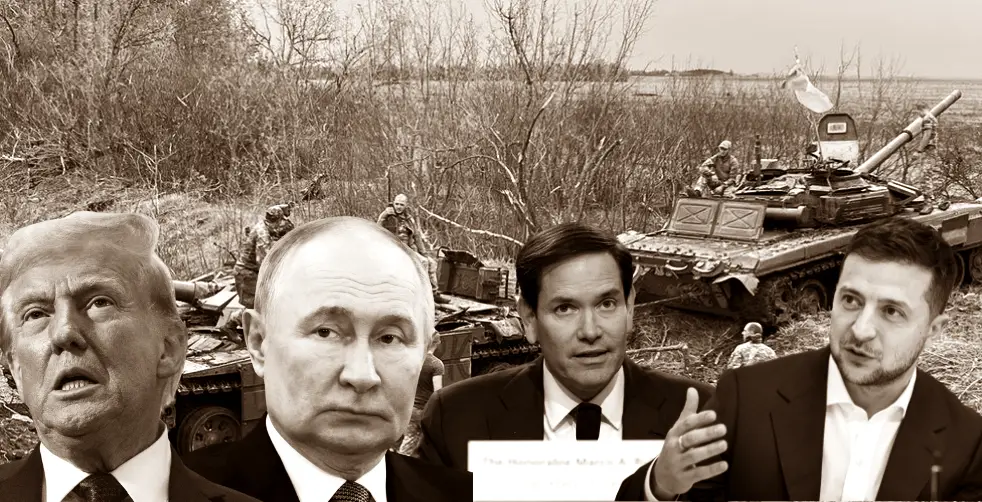It was a sentence that almost got lost in the noise of the news - and yet it heralds a geopolitical earthquake. “Putin told me very strongly that Russia will respond to Ukraine’s attack on its air bases.” With these words, U.S. President Donald Trump spoke on Wednesday via his own social media platform - laconic, cold, almost offhand. But the message is anything but incidental: the Russian president made it clear to his American counterpart over the phone that, in his view, the threshold for escalation has long been crossed.
Trump himself called the conversation “good, but not one that will lead to immediate peace.” It is the president’s first direct comment on the spectacular Ukrainian drone strikes on Russian air bases, in which Kyiv claims to have hit or destroyed 41 aircraft - including strategic bombers, reconnaissance planes, and transport aircraft. Long-range drones guided by artificial intelligence are said to have made the attack possible. Since then, Moscow has remained silent - broken only by rage and promises of revenge. That Donald Trump spoke with Putin but not with Ukrainian President Volodymyr Zelenskyy says much about the imbalance of American foreign policy under his second term. The president, who once promised to end the war before his inauguration, has entangled himself in a sluggish, contradictory silence. On the one hand, he publicly pleads with Putin to “finally stop” - on the other hand, he avoids any clear sanctions. The Kremlin is exploiting the gap. While Zelenskyy tells reporters in Kyiv about “show diplomacy” and dismisses Russia’s ceasefire proposal as “an ultimatum in spam form,” Moscow continues to build up its troops at the border. Nine villages in Ukraine’s Sumy region are said to have already fallen.
Putin, who once again refused a direct meeting with Zelenskyy, accused Ukraine in a video conference on Wednesday of committing “terrorist acts” on Russian railway lines. “How are such summit meetings supposed to happen under these conditions? What should we talk about?” he asked - rhetorically, self-assuredly, dismissively. For him, the ceasefire is only a means of delay, a strategy of attrition. For Zelenskyy, on the other hand, it would be a precondition for serious negotiations - ideally mediated by the United States, with a possible trilateral summit in Istanbul, the Vatican, or Switzerland.
But the U.S., it seems, is retreating. Defense Secretary Pete Hegseth skipped the Ukraine Contact Group meeting in Brussels - for the first time since the group was founded three years ago. It is a symbolic act that does not go unnoticed. In a report published Tuesday by the renowned Center for Strategic and International Studies, it states: “Without serious pressure, Putin will continue to drag out the peace process, continue fighting - and wait for the United States to look away.”
Frustration is growing in Ukraine. The talks in Istanbul again ended without results. “A political performance,” Zelenskyy called the meeting. “The same paper as last time - just copied, reprinted, with no content.” Russia is not interested in ending the war, but in the appearance of dialogue - to calm the world, not to stop the killing.
Meanwhile, the war rages on - along the 1,000-kilometer front line, in the Donbas, near Kharkiv, in the air and underwater. Ukraine’s security service reports it detonated explosives under the Crimean Bridge. The Russian Ministry of Defense denies it. Truth is no longer measurable - it is a question of perspective, of propaganda, of delay.
And Trump? As so often, he remains between worlds. Between rhetorical distance and factual closeness to Moscow. Between a promised end to the war and real inaction. Between a phone call with the aggressor and radio silence toward the victim. His statement that Putin announced a response remains in the room - without context, without position, without a diplomatic counterbalance. It is a dangerous vacuum. Because if the President of the United States is only a listener in a war where the weapons also come from American factories, then the West loses not only influence - but also morality.
These days, the world is looking at three places: at the smoking ruins of Russian airfields, at the failed negotiation table in Istanbul - and at the Oval Office, which was once the center of Western responsibility for peace. Today, it houses a man who speaks of peace but listens to dictators. Who dreams of the war’s end but says nothing of justice. And who, in his silence, creates the very vacuum that war needs to grow.
History will remember such moments - not because of their noise, but because of their absence. In a world fighting over every word, those who remain silent are the most dangerous actors
